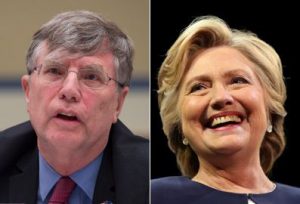 A senior State Department official proposed a “quid pro quo” to convince the FBI to strip the classification on an email from Hillary Clinton’s server – and repeatedly tried to “influence” the bureau’s decision when his offer was denied, even taking his plea up the chain of command, according to newly released FBI documents.
A senior State Department official proposed a “quid pro quo” to convince the FBI to strip the classification on an email from Hillary Clinton’s server – and repeatedly tried to “influence” the bureau’s decision when his offer was denied, even taking his plea up the chain of command, according to newly released FBI documents.
Fox News first reported Saturday that the FBI interview summaries and notes, known as 302s, contained allegations of a quid pro quo. Republican Rep. Jason Chaffetz, who initially told Fox News of the claim, called it a “flashing red light of potential criminality.”
Documents published Monday morning confirm the account. Notes from an interview with an unnamed FBI official reveal the State Department Undersecretary for Management Patrick Kennedy tried to horse-trade with the FBI, offering additional slots for the bureau overseas if they would de-classify a particular email marked “SECRET.”
According to the documents, an unnamed individual said he was “pressured” to “change the classified email to unclassified.”
“[Redacted] indicated he had been contacted by PATRICK KENNEDY, Undersecretary of State, who had asked his assistance in altering the email’s classification in exchange for a ‘quid pro quo,’” the 302 states. “[Redacted] advised that in exchange for marking the email unclassified, STATE would reciprocate by allowing the FBI to place more Agents in countries where they are presently forbidden.”
At a subsequent meeting at the State Department regarding the classification review of Clinton’s materials where Kennedy presided, someone asked whether any of the emails in question were classified.
“Making eye contact with [redacted] KENNEDY remarked, ‘Well, we’ll see,’” the document says. The official, according to one account, was “attempting to influence the FBI to change its markings.”
Kennedy allegedly asked at that point who else he could speak with and was referred to Michael Steinbach, then a top official with the FBI’s Counterterrorism Division. Kennedy “continued to pressure the FBI to change the classified markings on the email to unclassified,” the document says. “STEINBACH refused to do so.”
The document says Kennedy then asked about whether the FBI would be making a public statement and was told they would not. Shortly afterward, the story about the email contents broke in the press and Clinton publicly denied having sent classified emails on her server.
In the wake of the document release, House Oversight Committee Chairman Chaffetz and House Intelligence Committee Chairman Devin Nunes, R-Calif., have written letters to Secretary of State John Kerry and Inspector General Steve Linick seeking Kennedy’s removal and a misconduct investigation.
“We find Under Secretary Kennedy’s actions extremely disturbing. Those who receive classified intelligence should not barter in it – that is reckless behavior with our nation’s secrets,” they said in a statement. “Someone who would try to get classification markings doctored should not continue serving in the State Department or retain access to classified information. Therefore, President Obama and Secretary Kerry should immediately remove Under Secretary Kennedy pending a full investigation.”
State Department spokesman Mark Toner on Monday denied the “quid pro quo” allegation.
At a press briefing, he said, “[Kennedy] contacted the FBI to understand what their rationale was for requesting an upgrade of this particular information.”
A spokesperson at the FBI provided a lengthy statement to Fox News on Saturday night ahead of the document release — disputing Chaffetz’s characterization and stating that, while the conversation did happen, the two issues discussed were not connected.
The FBI account is as follows:
“The FBI determined that one such email was classified at the Secret level. A senior State Department official requested the FBI re-review that email to determine whether it was in fact classified or whether it might be protected from release under a different FOIA exemption. A now-retired FBI official, who was not part of the subsequent Clinton investigation, told the State Department official that they would look into the matter. Having been previously unsuccessful in attempts to speak with the senior State official, during the same conversation, the FBI official asked the State Department official if they would address a pending, unaddressed FBI request for space for additional FBI employees assigned abroad. Following the call, the FBI official consulted with a senior FBI executive responsible for determining the classification of the material and determined the email was in fact appropriately classified at the Secret level.”
According to the FBI, “The classification of the email was not changed, and it remains classified today. Although there was never a quid pro quo, these allegations were nonetheless referred to the appropriate officials for review.”
The FBI documents fueled GOP allegations about Clinton’s handling of classified material.
“These documents further demonstrate Secretary Clinton’s complete disregard for properly handling classified information. This is exactly why I called on DNI Clapper to deny her access to classified information,” House Speaker Paul Ryan said in a statement. “Moreover, a senior State Department official’s attempt to pressure the FBI to hide the extent of this mishandling bears all the signs of a cover-up.”
Kennedy appears in other sections of the FBI documents as well. According to another FBI interview, Kennedy wanted some information changed to an obscure code known as B9 to “allow him to archive the document in the basement of DoS [Department of State] never to be seen again.”
The State Department inspector general also told the FBI Kennedy’s “tone and tenor were definitely not positive when dealing” with their office.
Fox News’ Catherine Herridge contributed to this report.

Leave a Reply